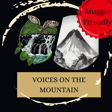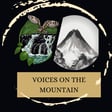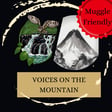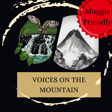Become a Creator today!Start creating today - Share your story with the world!
Start for free
00:00:00
00:00:01

Stress part I
Is stress always good or bad?!? According to TCM, what kinds of stress should be on our radar and what is the way to navigate these stresses for optimal health? Tune in, practitioners and muggles alike, for a deep dive into this key element of a healthy lifestyle!
Transcript
Introduction to Stress with Dr. Steven Guggenheim Wong
00:00:10
Speaker
This week on Voices on the Mountain, we're going to be talking about stress with Dr. Steven Guggenheim Wong. Nice.
Types of Stress: Physiological, Physical, and Thermal
00:00:20
Speaker
And we're not going to just be talking about physiological stress. We're going to be talking about physical stress, like to the body, and thermal stress.
00:00:31
Speaker
That's right. Yeah. Kind of like a big three for all you stressors out there, which is kind of everyone, right? Yeah, totally. All right. Let's kick it off. Which one do you want to do first, Asher?
Positive Side of Stress: Growth Beyond Comfort Zones
00:00:43
Speaker
Well, first, I think we should talk a little bit about what we mean by stress. Because in our society, we're like, everyone's stressed, and you don't want to be stressed. But we're going to introduce a kind of different way of thinking about it, where it's not just a bad thing.
00:01:00
Speaker
It's a pushing outside your comfort zone type of idea. Yeah, totally. And I think we see this a lot now with cold, plunging, hot yoga.
00:01:15
Speaker
I mean, I think psychological stress, people have been pushing the boundary on that for quite
The Balance of Activity and Rest: Lao Yi, Yo Du
00:01:19
Speaker
some time. But the whole idea is Chinese medicine has this nice four character phrase. It's called lao yi, yo du, which means lao is like fatigue, labor.
00:01:32
Speaker
pushing yourself, challenging. E would be the opposite. That's the couch potato side. That's the rest and recovery side. Almost too much, right? That's like the leisure suit Larry never leaves Copacabana sort of thing. And then Yodu, like to the right degree. So what's the right degree between these? So that's a really key point. Remember, I think everybody knows like the middle road and those sorts
Finding the Right Stress Balance: Strength vs. Harm
00:01:55
Speaker
of things. But when it comes to health,
00:01:57
Speaker
We really need to find that middle road between how much stress is good for the body, actually strengthening and rebuilding, and how much is detrimental to the body. And what's the what are the signposts? What are the symptoms? And then how do we navigate that? You know, if how do we shift and so forth? Totally. Yeah, I feel like
00:02:16
Speaker
you are who you are. And if you're one of the people who's going to be pushing their boundaries all the time, then when you run into problems, you're likely to keep on trying to push them. And if you're one of the types of people who wants to just rest and recover and maybe go more introvert or whatever, you're going to be going that way. When you run into problems and it's like,
00:02:36
Speaker
It's not always whatever is more comfortable. It's about pushing it the other way. Just like Asher said, it does require a little bit of self-knowledge too like knowing your own habits and patterns and then working with that.
The Five Fatigues Explained
00:02:50
Speaker
When we were talking about this before, you brought up the five different fatigues as a starting place and I had no idea we were talking about.
00:03:00
Speaker
Well, let's do it up. Let's look what excess of five key things are. And we'll just jump right into a Neijin quote here. So this is from the Suwen Xuanming Wu Chi chapter. And it talks about five key fatigues and what those are going to do to our body if we do, meaning fatigue, meaning that excess to the point of damage sort of thing.
00:03:23
Speaker
So it starts off with which means looking too long or reading too long. The word for to look and to read is the same in Chinese. And so this just means basically over focusing with your eyes too long. Shout out to screen time in modernity, right? So too much of that will damage your blood.
00:03:44
Speaker
And then the second part, which means excessive laying down will harm your qi. And then excessive sitting for sitting for too long will damage your flesh and your tissue and your muscles. Standing too long will damage your bones, which means
00:04:07
Speaker
walking excessively or for too long will damage your sinews, your sinews, your tendons, your ligaments. We just lumped that all into jin, which was kind of like sinews in Chinese medicine. So those are the five biggies.
City vs. Rural Health: Lifestyle Impacts on Spleen
00:04:19
Speaker
And for any of you five elementors out there, you can probably already start seeing connections, right?
00:04:24
Speaker
So we know that the spleen controls what we call the muscles or the tissue. And so sitting harms your spleen. So literally, when we talk about the office work era of modernity, it's no surprise why all of these city dwellers are spleen deficient. So if any of you guys have been to China and the big cities, or in America, it's the exact same way, check out what a city dwellers pulse feels like versus
00:04:54
Speaker
farmer's pulse. It's not even close. It's literally across the board. You feel a farmer's pulse and it's just an entire different thing. They grew up farming, they have a strong, robust pulse. That is nine times out of 10. You know it's
Lifestyle Differences: Farmer's Strong Pulse
00:05:10
Speaker
going to be there. It's fun. It's not even a subtle thing. I remember one of my patients, his wife or partner, she was in school at the Denver School.
00:05:21
Speaker
And they were doing a pulse class. They were learning pulses that day in diagnostics. So they invited people in and everyone was taking each other's pulses and be like, yeah, I think I noticed a little bit of this and that. And then they take his pulse and they're like, what are you, a machine? Like this isn't even the same, you know, it's not even the same echelon of thing. And he's like, I just like hunting sometimes.
00:05:42
Speaker
He's a great guy, really just solid. He's a big firefighter dude. Not like burly big, but like six too big. But not like NFL big, but he just had one of those farmer's pulses and it's so, so common among farmers. They're just so much stronger, probably a lot because they're just not harming their spleen all the time.
00:06:03
Speaker
I was thinking the excessive looking, one of the translations is reading and that feels like very close, close to a text. Your eyes are scanning versus when you're out on the farm or a ranch, your eyes are looking at the horizon. You're focusing on things farther away with a big difference too, because you look at something really far away and you look at something really close. And we know from our modern Western ideas that that's a better way for the eye to behave in a more natural way.
00:06:30
Speaker
Heck yeah, heck yeah, and way less damaging, a lot less, like actual vision decreases. So you'll be changing your glasses prescription a lot less. But yeah, even just that idea of Azure said shift between looking close and looking far away.
Office Workers: The Importance of Movement
00:06:46
Speaker
That's why I always tell people who are office workers, computer users, and so forth.
00:06:51
Speaker
Try and set that hourly timer and just let it buzz every hour. Just stand up, shake things off, look in the distance, take a couple of deep breaths, one minute out of every hour. That's all it takes. Your neck will thank you, your eyes will thank you, your muscles will thank you, and then, of course, your spleen will thank you. Yeah. For some reason, it's so hard when you're in the middle of it because you think, oh, I'm just going to push through and then I want to be healthy later. And it's like, no, no, no, just break it up. Do a little bit as you go.
00:07:18
Speaker
Don't build up the stagnation much easier to take care of it as it comes. That's a good point. You could write a whole book called I'll Be Healthy Later. Yeah. America. So what defines excessive?
00:07:34
Speaker
in these fatigues that we just went over. Great point. So just like Asher is saying, the key here about excessive means we want to do those things. Obviously, we need to use our eyes and look at things, but what is too much? And too much is to the point where we strain the organ, so in this case, the eyes or the muscles or anything, to the point of damage.
00:07:57
Speaker
So the key is challenge good, damage
Exercise Intensity: Recognizing the Right Level
00:08:00
Speaker
bad. And we need to find that intermediate area. There's actually a nice quote from the Jin Dynasty too. And he says, like in Chinese it says, which means like the body wants to be active and physically like move around. But you shouldn't be, you shouldn't take it to the excess or the extreme.
00:08:24
Speaker
Meaning, we want that movement, we want that challenge to the body, just not too much. So we can actually break it down into three different ones. So let's just do a basic physical one. So let's do exercise because most people are, I think, trying to exercise a lot, right? So if you go and work out, what's what's some signposts that you did it right and what's some signposts that you did it wrong?
00:08:45
Speaker
If you're sore in multiple muscle areas, not just in one single muscle, but sore in a whole area for about a day, you knocked it out. That was exactly right for you. And you probably don't want to do that every day because the next day you want to do something else and let that area rest.
00:09:03
Speaker
If you're sore for two days, push it a little too hard. And if you get more sore in that second or third day, you pushed it way too hard. Then you're actually pushing it towards potential injury. So if you get more sore the second day, that just tells you, you probably haven't done this
00:09:18
Speaker
And people are like, oh, but now I'm weak. Yeah, but you're probably just, you know, if it's shooting a bow and arrow, maybe you're out of bow and arrow practice. That doesn't mean you're weak everywhere. You're just good at what you do, right? So I think there's a pride thing that comes into it. I see it a lot with people who come back to activities. It's like, for instance, if someone's like a martial artist and then they take five years off, they come back and spar and they're trying to do the exact same like drop sweeps that they did when they were there before. Oh, man, that's a recipe for everybody getting hurt.
00:09:47
Speaker
Yeah, I've been there. It's hard because I think you remember what you used to be able to do. And you're like, why can't we do that? Come on, buddy. But did should equal do. Yeah, it just doesn't. And it's not like you might get back there. That's the thing. Try and tell people it's all about patience. When it comes to physical exercise, the two biggest words I always tell people, gradual, consistent.
00:10:15
Speaker
And I really think the first 40 years of our life are just to learn consistency. Because the last 40, well, it should really be the last 60 or plus years of our life.
Consistency in Fitness: Stories of Ageless Strength
00:10:26
Speaker
Because if we're not aiming for 100, we're doing something wrong. But the last 60, 80 years of our life, you can be just as strong really as you want to be.
00:10:34
Speaker
I met this 70-year-old man in China. He was notably stronger than any of us, and we were in our 30s or 20s. Actually, a lot of my classmates, yeah, they were in their 20s. His chest was like twice as big as us. He didn't even start exercising until he was 60. He was a bus driver for his whole life. Then at 60, he was a bus driver for the neighboring college. It was the fashion college in Beijing. He's like at 60, he retired because they do it a little earlier on the communist side of the world.
00:11:01
Speaker
Good for them. Well, you still have some good years left. Got a little zest in there. And he was like, well, I heard exercise is good. So I decided to hike a hill or a mountain every other day. And then on the other days, I'd go work out on the bars. And he came to our college, which is right across the street, to just do pull-ups and push-ups and stuff. And he started as a 60-year-old man who hadn't worked out his whole life.
00:11:24
Speaker
I met him when he was 70. His chest was twice the size of all of us. He was doing these V-style chin-up things. We were like, what? You're holding that position while you do the thing? It took us weeks to learn what he was doing and to build up the strength for the different exercises. All I'm trying to say here is age is not the restrictor. The restrictor is the consistency.
00:11:47
Speaker
If he takes a day off, he'll feel it. He's 70. But especially a 20-year-old male who's got testosterone pumping out their ears, they take two weeks off. They're not even going to know the difference. And so that's the whole thing is age is generous. Youth is generous, I should say. But it's that time period to learn consistency. And if you're not learning consistency by the time you're 40,
00:12:11
Speaker
Your body is not going to appreciate it. So it's all about those slow, gradual changes and staying consistent. So consistency always beats quantity. Awesome. So good guideposts for those weekend warriors out there. Nice. You're sore on day two, too much. If it gets worse on day two, you really did too much. You betcha. And how do you know if you did, and if you didn't, if you're not sore the next day, then you, then you didn't do enough.
00:12:39
Speaker
Yeah, that's a good point. As long as you increased your energy, you probably did some. And then I think that's for all the, there's people that just do exercise science and all that stuff. But if you're not sore, you just got a different function, right? You got movement, you got circulation. And that could actually even get into the idea of does Chinese medicine prefer strength training to cardio training? And the general gist, we should actually do a whole episode on that. That'd be fun.
00:13:05
Speaker
Yeah. Yeah. Kind of the teaser is cardio is about moving, right? So if your goal is move the blood, move the fluids, move the chi, that's it. And if your goal is strengthening an organ, specifically usually the spleen, then it's about strength training.
00:13:22
Speaker
Gotcha. I usually think about it as the movement and a free flow of movement because you watch those old guys do the one-inch punches and the amount of force they generate off of nothing and you're like, well, it's not because of his big muscles anywhere. There aren't big muscles anywhere. It's about how he uses his entire body to generate force in such an effective manner. Exactly. Yeah.
00:13:46
Speaker
Yeah, Azure totally. For any of you guys who like martial arts or anything like that, obviously Asia is a great place to go.
00:13:54
Speaker
There's a great, one of the well-known authors and practitioners in our medicine named Tom Bisio. He's out in New York. He writes about this and stuff in his books too. But anyway, he was talking about like, yeah, he went to China and like, these rail thin dudes are pushing them around. And Tom's a pretty well-built dude, right? But same thing, like my, the Bagua teacher that I studied with, he's my Bagua master I studied with for the last four years.
00:14:19
Speaker
He actually met him through Tom, but same thing. He's 70, and man, he is fast and strong and accurate. Nobody messes with that dude, man, and he's 70. It's obviously just like Asher said, he's not bisepting us out of the way. It's all about integrated movement. If you want to think about, there's a lot of different ways to talk about what we call internal martial arts in Chinese medicine.
00:14:42
Speaker
But I agree. I think the number one thing is actually just what Asher hit on. It's about integrated movement. It is about chi and energy flow. That's true. There is that component. It is about breath. That's true. That is a part of it. But more than anything, it's about that integrated movement. And if you learn how to, when you're literally moving your arm to not just move it through your foot, which is kind of like
00:15:03
Speaker
That is the idea, but sometimes that's such a macro idea that people lose track. It's like, is your elbow tracking with your knee? Is your shoulder tracking with your hip? Is your hand tracking with your foot? Are you guiding up through the root, transmitting through the center, and then releasing through what we call the branches?
00:15:20
Speaker
There's just so many excellent ways of training this. I mean, it's literally the focus of all of the internal arts. So if you guys want to learn that, check out the three biggies, which are Tai Chi or Tai Ji, however you want to say it. Just try and make sure if you want to find a good Tai Chi practitioner, find one who does pushing hands or at least teaches you how to apply or fight.
00:15:42
Speaker
I know that sounds funny, and I'm not saying I'm pugilistic here, but what I am saying is if you don't learn the fighting side of it, you don't actually get the full cultivation side because your posture is not right and you're not doing everything correct. The fighting and the pushing hands actually forces you to be in the right postural alignment and so forth. The second one is called xingi chuan, which is sometimes translated as mind form fist or intention form fist. And then the third one is bagua zhang, which is the one I studied a lot.
00:16:11
Speaker
So we talked about the physiological stress, but we haven't yet dive into the thermal stresses. And in America right now, it's pretty big, the extremes as always.
00:16:25
Speaker
hopping into ice baths or doing hot yoga. People are all about adding another stressor to their physical activity or life. You know, they're like, exercise is good, more exercise is better. And oh, hey, if we add a thermal stress, it must be like, you know, godlike.
Hot Yoga and Bikram: Balancing Benefits and Risks
00:16:45
Speaker
Yeah. So what do we think about that? And I know from going through school, there was a lot of like,
00:16:51
Speaker
you know, definitely don't be around cold. Cold is bad. It's really, really bad. Don't ever be around cold. And then the we never really touched on on Bikram stuff, but I see a lot of actually patients in my practice that are doing a hot yoga and I have some thoughts on maybe not the best. They're dead. Did you hear some air quotes around thoughts? You have some thoughts on that one?
00:17:18
Speaker
Yeah. Some ideas. You betcha. Some ideas. No, I think I basically, the people I see who come out of Bikram Yoga usually have tightness in their pelvis or in their hamstrings. And they love yoga because they're good at their limber already. They're a naturally stretchy person, right? Lots of people that I meet that do yoga do it because they're good at it, not because they're bad at it.
00:17:46
Speaker
And that's one of the things where it's like, oh, if you were bad at yoga, it's probably better for you because you're tight all over and you need to stretch it out in your limber. But a limber person loves yoga because they're like, oh, I'm really good at this. Like, look how deep I can get in this pose and just hold it. And then they have the heat part and they can stretch even further. But then the antagonist muscle might not be happy. And some other things just get tight and not happy.
00:18:12
Speaker
Yeah. I mean, you said it exactly, right? It's the same idea that we should be pushing ourselves towards what we're not good at, which, like Asher said, doesn't do great things for our ego. Well, it does, but it's not always fun. It's not comfortable. It's not comfortable. I like being good at things.
00:18:32
Speaker
Um, yeah, but like, you know, like my brother just, I think it's just natural. He's just got so much better balance than I have. You know, I have a different strengths in it. Well, yeah, different advantages, but he was just more balanced than I was. And so, you know, I could try and push him through a room. That's not a problem, but I can't out handstand him or something. He was just, and so obviously that's the area that I should be working on, you know?
00:18:57
Speaker
But it's one of those things, it's like you got to kind of put in the work, you got to realize that it's just a reminder that you need a little booster on that side. So just like Asher said, yoga, absolutely, it's wonderful. And most of us need it. But there is definitely the hypermobile that really do not need that. And they'll fall out of socket, they'll do a lot of other things. Just like Asher said, they'll overcompensate with other muscles if they overstretch certain ones. I mean, that's just a recipe for injury on a lot of levels.
00:19:26
Speaker
I think you bring up your brother is actually an interesting point because I usually find it's easier to push myself when I have an adversary,
Peer Influence: Motivation for Improvement
00:19:36
Speaker
right? Like that person who I'm chasing, who's also a peer, right? I'm competitive with them. It's not like they're that much better than me in any one area. I can see myself getting to their level in Go, which is the, or Wabak,
00:19:50
Speaker
That's Korean. What is it? Weiqi in Chinese. That's right. There's an idea of chasing people who are better than you. And so it's like that person that you're chasing is just out of reach, but you're also just close enough to be on their heels. And those relationships are really helpful for pushing you outside of your comfort zone and then to seeing your incremental change that you get better.
00:20:13
Speaker
Because when you don't see that, when no one notices that, it can get harder to continue a practice or a skill development if you're not getting that positive feedback. You bet. You bet. It's like the belt system in martial arts in America. There's no belts in China. When's the last time you went there and saw a green belt?
00:20:34
Speaker
Yeah, there is in Japan, I guess. But I don't know how traditional that was, or I don't know the history of that. I focus on Chinese things more. But I mean, if you look at, yeah, I mean, we just practice in the park every day. And we'd wear nice, ridiculously comfortable MC Hammer pants. And that's about it. You just dress how you want. But like, you just got to have the mobility, right? Yeah, exactly. And there are like the Chinese martial arts outfits. But unless you just want to be that guy, you just show up with the pants and then like a t-shirt or something, you know?
00:21:05
Speaker
Yeah. Yeah. You usually take the teacher's cues and I've never seen a teacher do that. Yeah. You don't go for Wing Chung if no one else is Wing Chung. Yeah. It would be nice if the foreigners would kind of pick up on the hints, read the room a little, but sometimes they don't.
00:21:24
Speaker
Oh, yeah, they have an idea in what their head. Yeah, exactly. And how that makes it cooler or you know, like just just get to the good stuff there. But yeah, when it same thing, it's it's about that martial arts, like kind of finding that balance and, you know, working on what you're good at and or working on what you're not so good at to kind of fill out the resources and fill out your skill set sort of thing.
00:21:49
Speaker
That wraps up this episode. We'll have more next week. Stick around if you want to dive deep with me and Steven on some more Chinese medicine.
00:21:59
Speaker
Yeah, I was thinking too, like this, one of the reasons why I liked the different ideas and professors that push you in like a safe way, right? Because it's like, yeah, show me where I'm weak, you know, like, oh, my pulse taking isn't the best, or, oh, my needlework isn't great, or, oh, I should be doing stuff with my offhand while I'm needling, or my palpation, whatever it is. It was just they always say, oh, a learning experience. And not a test that you failed, and that's who you were, right?
00:22:29
Speaker
It was just a continuing process of, oh, here's where I'm weak. Here's where I'll practice, get stronger, and then come back and do it again.
Improving Weaknesses: A Judgment-Free Approach
00:22:38
Speaker
Totally. I really wish, and I do think there's a pedagogy thing in there too, but yeah, I really wish that people would start attributing weakness and strengths of what they're doing, or even themselves. This muscle is weaker than I want it to be. Great. That doesn't mean you're a weak human.
00:22:54
Speaker
that just means work on that muscle, just like you said. I mean, who goes to school and comes up being like, I have conquered the pulse? I mean, if they have, they're like an absolute maniac, so don't go to them, right? You know, there's some schools, I guess, in America that don't even teach the pulse. Did I tell you that? I heard about that when I came back. Oh, God. Yeah, like there's, and I don't think they teach herbs, and so that's their, I don't know, somewhat rationale, but like, they're like, oh, we don't teach herbs, so we don't even teach the pulse.
00:23:21
Speaker
Well, it's pretty darn useful. I mean, the Ling Shu and literally every chapter, every chapter talks about it and Ling Shu is really focused a lot more on acupuncture. In fact, every channel, like of the 12 major organ channels, they tell you when the pulse is like this, do this. And you're like, so I think we should focus on that. Yeah, you can't skip that bad boy. Um, and you know, it's just one of those things like, um, it's, it just takes a little bit more time.
00:23:47
Speaker
The pulse also shouldn't be mysterious. It should just be a little bit more challenging. But when people make it esoteric and weird, they're usually just complicating because they don't know what it is. It's not it's not mysterious. It's just subtle. And so you just have to pick up subtleties. Yeah, I think the hardest thing about the pulse, too, is that to to really learn, you have to feel the pulse that. Like a master or someone who knows what they're doing more.
00:24:17
Speaker
feels too. And then they tell you what it is. And you're like, okay, then that's why I feel when you're like, I've taken a lot of pulses, but had very few instances of a teacher and me going through the pulse, you know, like maybe a dozen or two dozen times versus a couple hundred pulses I've taken. So for me, I'm like always just what's different, what really stands out, and then slowly cataloging all those experiences to try to like narrow it down to what it means in the body.
00:24:49
Speaker
Yeah, Asher's spot on. I know this is not a pulse class. We should probably talk about that, but I think he's spot on. If you can link it to what you are feeling, like the first time I ever took a slippery pulse and I was like, my teacher was, of course they're my herbs teacher, he took the pulse. I took the pulse and I read what he wrote down on his diagnostic sheet. He always writes on the side of his prescription.
00:25:10
Speaker
what do you call those? Little pieces of paper where you write the herbs on one side and all the diagnostic stuff on the other. I could, of course, read. He wrote Slippery Pulse there. I was like, really? I would have described that as the pulse was rolling backwards. That's what it felt like on my finger, but now I know.
00:25:26
Speaker
That's what it feels like in my finger is when the pulse is rolling backwards. And so that's the first way I learned slippery and then you learn some other subtleties around it and stuff. But it just like Asher said, it's like, it's kind of like what you just said too about pacing yourself with workouts and stuff or like the go players or weight cheap players, getting that better person to kind of lead you through stuff like that. Absolutely.





